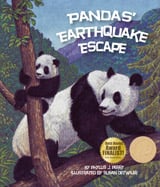Alignment to Standards for NH

| Grade | Number | Standard |
|---|---|---|
| 2 | S:ESS1:2:5.1 | Recognize that some changes are too slow or too fast to be easily observed. |
| 2 | S:LS1:2:1.2 | plants and animals as living things and describe how they are alike and different. |
| 2 | S:LS1:2:2.1 | plants and animals have features that help them survive in different environments. |
| 2 | S:LS1:2:3.1 | parents and offspring of many species closely resemble one another; and describe the similarities in appearance of given plant and animal families. |
| 2 | S:LS1:2:3.2 | living things have a life cycle, during which they are born, grow, and die. |
| 2 | S:LS3:2:3.1 | similarities and differences in both behavior and appearance of plants and animals. |
| 2 | S:LS3:2:3.2 | there are different species of living things in various places around the world. |
| 4 | S:ESS1:4:5.1 | Identify and describe processes that affect the features of the Earthês surface, including weathering, erosion, deposition of sediment. |
| 4 | S:ESS1:4:5.2 | wind, water, or ice shape and reshape the Earthês surface. |
| 4 | S:ESS4:4:1.1 | Recognize that man uses various mechanical devices to record changes in the weather and the Earth. |
| 4 | S:LS1:4-3.4 | Predict, sequence, or compare the life stages of organisms (plants and animals): e.g., put images of life stages of an organism in order, predict the next stage in sequence, and compare two organisms. |
| 4 | S:LS1:4:2.1 | living organisms have certain structures and systems that perform specific functions, facilitating survival, growth and reproduction. |
| 4 | S:LS1:4:2.3 | physical structures of an organism (plants or animals) allow it to survive in its habitat/environment |
| 4 | S:LS1:4:3.1 | plant and animal characteristics that are inherited, such as eye color in humans and the shape of leaves in plants, and those that are affected by their environment, such as grass turning brown due to lack of water. |
| 4 | S:LS1:4:3.2 | living organisms have life cycles, which include birth, growth and development, reproduction, and death; and explain how these life cycles vary for different organisms. |
| 4 | S:LS2:4:1.1 | Describe how the nature of an organismês environment, such as the availability of a food source, the quantity and variety of other species present, and the physical characteristics of the environment affect the organismês patterns of behavior. |
| 4 | S:LS2:4:3.1 | plants and animals interact with one another in various ways besides providing food, such as seed dispersal or pollination. |
| 4 | S:LS2:4:3.2 | Describe ways plants and animals depend on each other (e.g., shelter, nesting, food). |
| 4 | S:LS3:4:1.1 | how environmental changes can cause different effects on different organisms. |
| 4 | S:LS3:4:1.3 | changes in the environment can cause organisms to respond (survive there and reproduce, move away, die). |
| 4 | S:SPS2:4:4.2 | Understand that some changes are so slow or so fast that they are hard to see. |
| 4 | SS:GE:4:3.2 | Demonstrate how physical processes shape features of Earth's surface, e.g., weather or tectonic forces. |
| 4 | SS:GE:4:3.5 | how humans interact with ecosystems: forest management, impacting wetlands. |